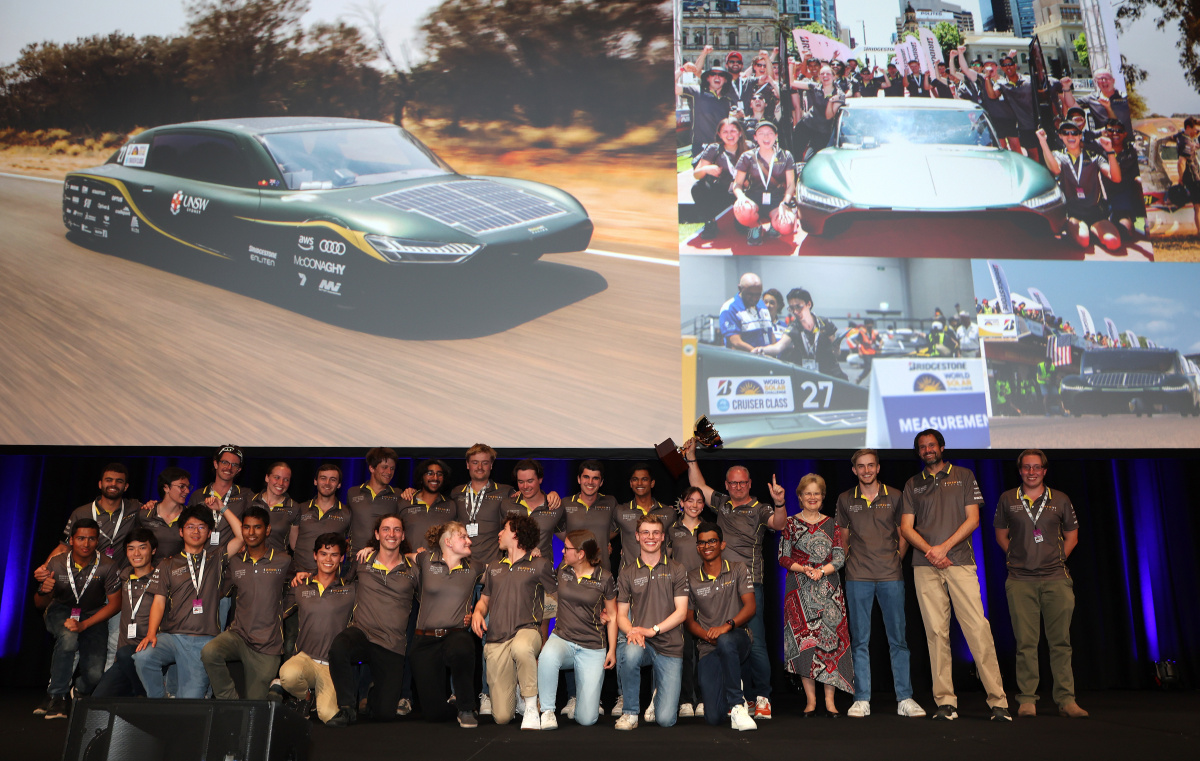Sun Sets on 2023 Challenge – Australia’s Sunswift Top Cruiser

Bridgestone World Solar Challenge
29 Oct 2023
Streets ahead in the CSIRO Cruiser Class field, Sunswift Racing from Australia has claimed its first 2023 Cruiser Cup victory.
Taking an early points lead, and never threatened, they carried four passengers most of the way. Too strong for the rest of the field, going on to win the practicality judging was the icing on the proverbial cake. The solar electric car, Sunswift 7 impressed on the road and on the judging floor. Overall, second place went to USA University of Minnesota in Gaia and third place went to Estonia’s team Solaride, in Solaride 2.
To win the Cruiser Cup, solar electric cars must complete the journey from Darwin to Adelaide within time windows and as energy efficiently as possible. Out of 10 Cruisers, six remained in contention after a drama filled second stage of strong headwinds and smoky conditions. Going into the practicality judging, Sunswift was leading on 109.4 points, followed by Minnesota on 30.8 points and Solaride on 20.5.
All Cruisers were then judged in Adelaide yesterday by an expert panel to evaluate the market potential of each solar electric car. The focus was on assessing characteristics such as: design innovation; environmental impact, ease of access; driver and passenger comfort; controls; features; style; and overall and desirability.
A range of features caught the judges’ attention from the choice of off the shelf components that could potentially inspire self-made EVs, 3D printing and eco-friendly materials and processes, winning combinations of tech and team talent, touch screens and infotainment, comfortable interiors, and overall style. In the practicality wrap-up, the Sunswift car continued its dominance with a score of 83.3 %. Second in the practicality ranks on 73.5% was Taiwan’s Apollo IX, and Australia’s ASCEND from Deakin University with its eco innovation came third on 72.8 %.
The combined final CSIRO Cruiser Class scores were Sunswift 91.1, Minnesota 22.4 and Solaride 14.7.
Event Director, Chris Selwood AM, said in the fifth iteration of the Cruiser class, this year’s solar electric vehicles were much closer to what you’d to see on the road. The design diversity was impressive, and I congratulate the Sunswift team on an all-round performance.
‘The determinants of success in this class are a combination of speed, endurance, and energy inputs before subjective judging. What is a practical car? We expose these young engineers to that intangible quality – desirability,’ Chris said.
‘The CSIRO Cruiser Class goal is to bring solar electric cars to the everyday driver. Sunswift is not just a beautiful car, she’s cleverly designed to deliver maximum performance for the BWSC regulations,’ Chris concluded.
From the field of 31 that left Darwin, 23 in the Projecta Challenger Class and 8 in the Cruiser class – only 12 Challengers completed the full 3022-kilometre course and six Cruisers remained in contention going into the judging. Line honours went to Belgium’s Innoptus in Infinite – a solar car that revelled in the conditions, with its futuristic fin for stability and aerodynamics. With an average speed of 88.2 kilometres per hour, they crossed the line first ahead of second place Team Twente from the Netherlands and compatriots Brunel in Nuna 12.
The awards were streamed live with team supporters back home tuning into the results. The Awards Ceremony also recognised Netherland’s Top Dutch Solar Racing Team for the Safety Award. The CSIRO Technical Innovation Award went to the Innoptus Solar team for features including the futuristic fin. The Prohelion Scrutineer’s Choice Award went to Estonia’s team Solaride the first car through scrutineering. The ‘David Fewchuk Spirit of the Event’ Award went to Japan’s team Tokai. The Rinstrum Precision Weight Award to Taiwan’s Apollo Solar car, and the Bridgestone E8 award went to team ASCEND along with the PR and Media award.
For the full leaderboard and results view the Honour Roll